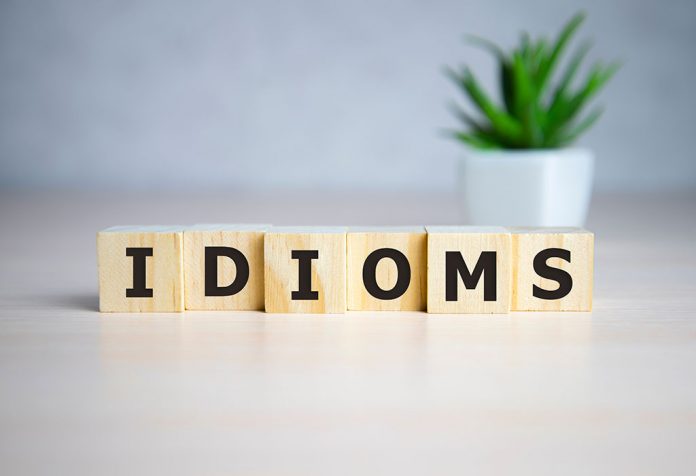Learning a language is not as simple as you think. There’s more to a language than grammar and vocabulary. Important things to keep in mind regarding a language include its culture and the history of the said language. Idioms are a big part of the cultural heritage of any language. They help a speaker communicate their thoughts in a particular way.
Idioms are very common in English, both in spoken and written form. Not everyone can guess what an idiom means just from hearing it. It needs to be read or explained. To understand how English idioms work, let’s continue reading and also learn about some common idioms.
Thank you for reading this post, don't forget to subscribe!
What Is An Idiom?
Read below to know the idiom definition.
Idioms are expressions that are part of a language and where the meaning of a phrase does not match the actual meaning of the words that make up the phrase. These expressions, phrases and idioms hold a meaning that isn’t literal but instead is more figurative.
Importance Of Idioms For Kids
It is very important to teach idioms since they are used in everyday conversation. If kids know the idioms, they will be able to grasp a conversation and participate in it. Apart from this, children will understand the workings of a language and learn the imaginative expression of the language and human thinking using idioms.
When Does Your Child Learn About Idioms?
Children are academically introduced to idioms in grades second and third. But that does not mean that kids cannot be taught idioms before that. As a parent or a sibling, you can easily introduce idioms to a child and then make them a part of your daily conversation.
Examples Of Idioms With Their Meanings
Here are some common and easy idioms for kids with their meanings. You can ask your child to frame sentences using the idioms mentioned below.
1. Head Over Heels
Meaning: Feeling of being very happy or excited about something.
E.g., The kid got a new cat and was head over heels in love with it.
2. Hit The Book(s)
Meaning: To go and study.
E.g., Rahul has an exam tomorrow, so he went home to hit the books.
3. Hold Your Horses
Meaning: To be patient.
E.g., Hold your horses Anjali, your turn will be up soon.
4. Keep An Eye
Meaning: To carefully watch.
E.g., Let’s keep an eye on Manas today. He was a bit sick this morning.
5. Keep Your Chin Up
Meaning: To remain joyful in a difficult situation.
E.g., Don’t be sad. Keep your chin up and keep practising for the exam.
6. On The Wrong Foot
Meaning: A bad start to something.
E.g., The day started on the wrong foot. First, I was late for school, and now there is so much traffic!
7. On The Fence
Meaning: To be undecided about something or someone.
E.g., I’m on the fence about our next trip location.
8. On The Same Page
Meaning: To agree about something.
E.g., All the students were on the same page about the picnic.
9. Out Of The Blue
Meaning: When something occurs unexpectedly.
E.g., It started raining out of the blue.
10. Raining Cats And Dogs
Meaning: A rainstorm that is loud and noisy.
E.g., We should not step out today. It’s raining cats and dogs!
11. Rise And Shine
Meaning: When it’s time to get out of bed.
E.g., Rise and shine, my dear. It’s time to go to school.
12. Saved By The Bell
Meaning: Rescued from a difficult situation at the very last moment.
E.g., The bus broke on the way, but I was saved by the bell; I took the last train just in time!
13. Start From Scratch
Meaning: To do something all over again.
E.g., This is not the correct way to solve the problem. Let’s do it from scratch.
14. Under The Weather
Meaning: To feel ill or sick.
E.g., Can we meet tomorrow? I’m feeling under the weather.
15. When Pigs Fly
Meaning: Something that will never happen.
E.g., Aman will go skydiving when pigs fly. He is scared of heights.
16. A Dime A Dozen
Meaning: Things that are common and easy to get.
E.g., Coffee houses are a dime a dozen! They are at every corner now.
17. A Picture Speaks A Thousand Words
Meaning: When visuals are more descriptive than words.
E.g., Show him how to tie with a rope; after all, a picture can speak a thousand words.
18. A Piece Of Cake
Meaning: When something is very easy to accomplish.
E.g., Making Maggi is a piece of cake.
19. All In The Same Boat
Meaning: When everyone is facing the same issues.
E.g., The team members were all in the same boat.
20. Back To Square One
Meaning: To start something all over again. (Psst: It’s just like – To Start From Scratch)
E.g., I lost my notebook. Now I’m back to square one.
21. Gut Feeling
Meaning: An intuition a person gets, especially when something might be wrong or right.
E.g., It wasn’t snowing at all, but my gut feeling told me not to go grocery shopping.
22. Go An Extra Mile
Meaning: To make an extra effort.
E.g., They went thAT extra mile to win the competition.
23. Cut To The Chase
Meaning: To get to the point of something and leave the details out.
E.g., Cut to the chase and tell me what you think about this showpiece.
24. Cross Your Finger
Meaning: To hope something goes right.
E.g., I crossed my fingers and hoped to get good marks on my Maths paper.
25. Crack Someone Up
Meaning: Make someone laugh.
E.g., The baby is so funny! He cracks me up!
26. Blue Moon
Meaning: Rarely happening.
E.g., She goes to the mountains once in a blue moon, but she usually prefers beaches.
27. A Hot Potato
Meaning: Difficult or dangerous to handle.
E.g., I tried learning Japanese, but it’s a hot potato.
28. Kill Two Birds With One Stone
Meaning: Get double results with one attempt.
E.g., The mother was killing two birds with one stone by singing rhymes to teach her elder child and pleasing her toddler as well.
29. Spin A Yarn
Meaning: To tell a long and far-fetched story.
E.g., My friend spins a yarn about her vacation all the time.
30. Build A Castle In Air
Meaning: To create ideas that are impractical, unlikely and impossible.
E.g., You should just stop building castles in the air and take your exams seriously.
31. Tall Story
Meaning: A long story that is hard to believe.
E.g., Don’t tell me tall stories; just show me the work I gave you.
32. Night Owl
Meaning: One who is active late at night.
E.g., It’s the time to be a night owl. My exams are starting next week.
33. Be Up Upon
Meaning: To be well informed.
E.g., Students must be up upon what they are learning in the class.
34. All Ears
Meaning: To pay special attention.
E.g., The students were all ears when the picnic planning was going on.
35. Mumbo Jumbo
Meaning: A pointless speech.
E.g., Ryan is just a baby, and most of what he says is mumbo jumbo.
When Should We Not Use Idioms?
Children must be taught that we shouldn’t use idioms in more formal situations, like important essays. This is because idioms are considered informal. We should also not use English idioms when talking to non-English speakers. They might understand the literal meaning of the words in the idiom and get confused.
Activities That Will Help Your Child Learn Idioms
Given below are some activities that will help your child learn famous idioms in English.
1. Idiom Challenge
Ask children to guess the meaning of popular idioms within a set time limit. The child with the highest number of correct answers wins the game!
2. Idiom Hunt
Give your child a story to read full of popular English idioms. Ask them to make a note of idioms they can find in the story.
3. Draw It Out
Ask your child to draw the literal and figurative meanings of easy idioms.
4. Match It
If your child can read, ask them to match the idiom to its meaning.
5. Note Down The Idioms About Learning
Find some good idioms on learning and ask your child to note them down in their copy with examples and meanings. Introduce them to one idiom daily.
6. Idiom Rhymes And Songs
There are many idiom songs and rhymes available for children online. Play them and let your kids learn idioms in a musical way.
7. Tell A Story
Challenge your little one to cook up a story related to an easy idiom.
8. Flashcard
Draw a picture related to the meaning of the idiom on a flashcard and show it to your child. See if they can guess the idiom correctly.
9. Circle The Idioms
Give your child a sheet with idioms and some random phrases written on it in a jumbled form. Ask your little one to find and circle the idioms.
Also Read:
Learn Describing Words for Children
Compound Words for Kids with Types and Activities
Vocabulary Words for Children to Improve their Language Skill












